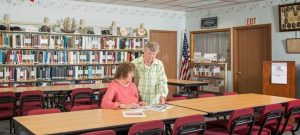Tazewell County news briefs
January 8, 2020REGIONAL
Gardening webinars offer inspiration for warmer weather
Even though it is cold outside, there is still a chance to get involved in gardening. University of Illinois Extension offers webinars that help everyone learn more and inspire us to prepare for spring.
Four Seasons Gardening webinars are taught by horticulture experts and can be attended from the comfort of your own home computer or phone. The classes are live and attendees can ask questions of the presenters. They are also recorded and can be reviewed at any time.
The winter series includes the following topics:
Planning your Garden for Seed Saving, Tuesday, Jan. 14, at 1:30 p.m.
Join Illinois Extension, Horticulture Educator Gemini Bhalsod in a webinar to learn important concepts and techniques for seed saving such as open pollination and variety isolation to get the best quality seeds for your garden.
Harvesting and seed storage will also be discussed.
Sowing of Seeds, January 28, 2020 at 1:30 p.m.
Learn how to start some types of seeds outdoors this winter. Join Illinois Extension, Horticulture Educator Nicole Flowers-Kimmerle in a webinar to learn important concepts and techniques for winter sowing seeds outdoors as a cost-effective way of growing your own seedlings for your garden.
Register at go.illinois.edu/fourseasons. The U of I Extension, Fulton-Mason-Peoria-Tazewell Unit offers the webinars for free. Some counties may also have the option to attend a viewing at the local Extension office. If that is of interest to you, contact your nearest Extension office to inquire. For additional Extension events and information visit our website at https://extension.illinois.edu/fmpt.
Nature Center hosts winter photography show
Celebrate the beauty of nature with the Peoria Park District’s annual winter photography contest and show. It runs from Jan. 17 through Feb. 14 at the Forest Park Nature Center, 5809 N. Forest Park Drive, Peoria Heights.
Visit Forest Park or call 309-686-3360 for more information. Forest Park Nature Center is open Tuesday through Saturday 9 a.m. to 5 p.m.
TAZEWELL COUNTY
Historical Society sets January meeting agenda
The next meeting of the Tazewell County Genealogical and Historical Society will take place Tuesday, Jan. 14 at 7 p.m. at the Ehrlicher Research Center, 719 N 11th St., Pekin.
January is our annual Show & Tell event. Bring a family story, artifact or research problem to share.
The meeting is free and open to the public. For more information visit www.tcghs.org or phone 477-3044.
STATE
Unemployment rate down in 13 metro areas
The unemployment rate decreased over-the-year in November in 13 Illinois metropolitan areas and increased in one, according to preliminary data released today by the U.S. Bureau of Labor Statistics (BLS) and the Illinois Department of Employment Security (IDES). Data also shows the number of nonfarm jobs increased in nine Illinois metropolitan areas, decreased in four, and was unchanged in one.
“As job growth continues to be strong throughout the state, Gov. Pritzker will continue to build on the momentum of the past year to expand long-term economic success,” said Deputy Gov. Dan Hynes. “Illinois’ bipartisan balanced budget and the historic Rebuild Illinois infrastructure plan are making critical investments and creating an economy that works for everyone.”
Illinois businesses added jobs in nine metro areas, with the largest percentage increases in: Champaign-Urbana (+3.4 percent, +3,800), Carbondale-Marion (+2.5percent, +1,500) Decatur (+1.5percent, +800), and Chicago-Naperville-Arlington Heights (+24,200 or +0.6percent). Total nonfarm jobs were down in Peoria (-1.7percent, -3,100), Davenport-Moline-Rock Island (-1.2percent, -2,300) and Danville (-0.4percent, -100).
The industry sectors recording job growth in the majority of metro areas included Government (11 of 14), Mining and Construction (9 of 14), Transportation, Warehousing and Utilities (9 of 14), Education and Health Services (9 of 14) and Leisure and Hospitality (8 of 14).
Not seasonally adjusted data compares November 2019 with November 2018. The not seasonally adjusted Illinois rate was 3.4 percent in November 2019 and stood at 12.2 percent at its peak in this economic cycle in January 2010.

The next meeting of the Tazewell County Genealogical and Historical Society will take place Tuesday, Jan. 14 at the Ehrlicher Research Center. (Photo courtesy of the TCGHS)
IDNR seeks pollinator-friendly habitat on solar sites
As part of a comprehensive effort to expand pollinator-friendly habitat in Illinois, the Illinois Department of Natural Resources (IDNR) is launching a new initiative involving planting pollinator habitat on solar energy sites in the state.
Opportunities to create and enhance pollinator habitat exist statewide — from private yards to roadways, and from farms to parks and natural areas. The new initiative to encourage pollinator friendly-habitat on solar energy sites is intended to complement those efforts.
In 2018, the State of Illinois enacted the Pollinator-Friendly Solar Site Act (525 ILCS 55/). This law required the IDNR to create a scorecard, with consultation from the University of Illinois. Before an owner of a solar site can claim to be pollinator friendly, they must achieve a passing score on the scorecard, make the scorecard available to the public, and provide a copy of the scorecard and vegetation management plan to the IDNR and a nonprofit solar industry trade association of the state.
Illinois Pollinator-Friendly Solar Site Act creates two different scorecards to support the planning of habitat and the evaluation of established habitat. Both scorecards include factors like the number of flowering plants and amount of the solar site that is covered in native species.
The planning scorecard is based on what is planned to be on the site and gives the owner preliminary recognition as “Pollinator-Friendly” for the first three years, giving the habitat time to grow and be used by pollinators. The second scorecard is used to evaluate established habitat to ensure what was planned is what is on the ground.
This established habitat scorecard must be completed every five years for a site to retain recognition as pollinator-friendly.
The IDNR is providing Solar Site Pollinator Establishment Guidelines and the Illinois Solar Site Pollinator Habitat Planning Form to help owners and managers of solar sites meet the requirements of the scorecards.
Pritzker expands benefit opportunities to more seniors
Starting Jan. 1, the Illinois Department on Aging (IDOA) will implement new annual income limits, making it possible for more individuals to qualify for the Secretary of State License Plate Discount, Seniors Ride Free Transit Benefit, and Persons with Disabilities Free Transit Ride.
“I would like to thank Governor Pritzker and the Illinois General Assembly for truly respecting yesterday, supporting today, and planning for tomorrow by raising the income eligibility limitations on this program,” said Paula Basta, director of IDOA. “These benefits support some of our state’s most vulnerable residents by assisting them in their transportation needs, so we are proud to announce that more individuals will be able to take advantage of this program.”
Specifically, as part of the bipartisan budget implementation bill, SB 1814, which was passed in May by the General Assembly and signed into law by Gov. J.B. Pritzker in June, it will now be easier for some to receive benefits from the Benefit Access Program, the formal name of the program that includes the Secretary of State License Plate Discount, Seniors Ride Free Transit Benefit, and Persons with Disabilities Free Transit Ride.
Any application submitted Jan. 1 through April 15 will continue to use 2018 income but will be subjected to the new income limits. Applications submitted on or after April 16 must use 2019 income to file.
If an applicant applied in 2019 and was denied based on 2018 income using the current income limits, they will be afforded an opportunity to re-apply. Once approved, benefits are valid for two years.








